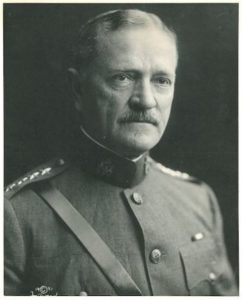
John J. Pershing
*John Pershing was born on this date in 1860. He was a white-American senior United States Army officer.
John Joseph "Blackjack" Pershing was born on a farm near Laclede, Missouri, to businessman John Fletcher Pershing and homemaker Ann Elizabeth Thompson. Pershing's great-great-grandfather, Frederick Pershing, originally named Pfersching, emigrated from Alsace, leaving Amsterdam on the ship Jacob and arriving in Philadelphia on October 2, 1749. Pershing's mother was of English descent.
Pershing was sworn in as a West Point cadet in the fall of 1882. He was selected early for leadership positions and successfully became First Corporal, First Sergeant, First Lieutenant, and First Captain, the highest possible cadet rank. Pershing also commanded ex officio, the honor guard that saluted President Ulysses S. Grant's funeral train as it passed West Point in August 1885. Pershing graduated in the summer of 1886, ranked 30th in his class of 77, and was commissioned a second lieutenant.
On October 20, 1892, Pershing was promoted to first lieutenant. In 1895, he took command of a troop of the 10th Cavalry Regiment, one of the original Buffalo Soldier regiments composed of Black soldiers under white officers. From Fort Assiniboine in north central Montana, he commanded an expedition to the south and southwest that rounded up and deported many Native Americans (Cree) to Canada. In 1897, Pershing was appointed to the West Point tactical staff as an instructor, where he was assigned to Cadet Company A.
Because of his strictness and rigidity, Pershing was unpopular with the cadets, who called him "Nigger Jack" because of his service with the 10th Cavalry. When the Spanish American War broke out in 1898, he commanded the 10th Calvary again. They fought together in Cuba and San Juan Hill. He openly praised the Buffalo soldiers for their bravery, which was unusual for a white man then. During his tour at the Academy, this nickname softened to "Blackjack," although, according to Vandiver, "the intent remained hostile." Still, this nickname would stick with Pershing for the rest of his life and be known to the public as early as 1917.
Under civilian military control, Pershing adhered to the racial policies of President Woodrow Wilson and southern Democrats who promoted the "separate but equal" doctrine. Black "Buffalo Soldiers" units were prohibited from participating with the American Expeditionary Force (AEF) during World War I. However, experienced non-commissioned officers were provided to other segregated black units for combat service, such as the 317th Engineer Battalion. The American Buffalo Soldiers of the 92nd and 93rd Infantry Divisions were the first American soldiers to fight in France in 1918.
Still, they did so under French command as Pershing had detached them from the AEF. Most regiments of the 92nd and the 93rd would continue to fight admirably under French command for the duration of the war. Pershing rejected British and French demands that American forces be integrated with their armies and insisted that the AEF operate as a single unit under his command. However, some American divisions fought under British command, and he also allowed all-Black units to be integrated with the French army.
Pershing is the only American to be promoted in his lifetime to General of the Armies rank, the highest possible rank in the United States Army. Other commanders and modern historians criticized some of his tactics at the time. His reliance on costly frontal assaults, long after other Allied armies had abandoned such tactics, has been blamed for causing unnecessarily high American casualties. In addition to leading the A.E.F. to victory in World War I, Pershing notably mentored many in the generation of generals who led the United States Army during World War II. John Pershing died on July 15, 1948.